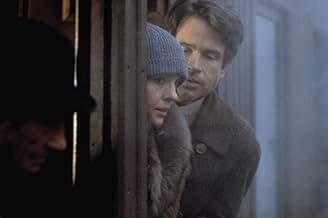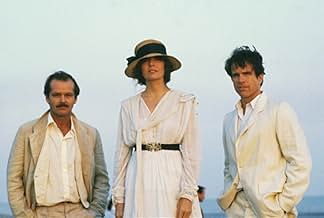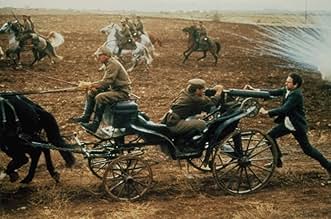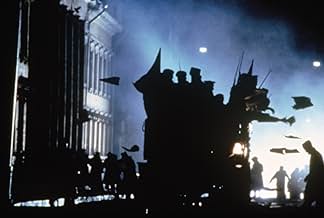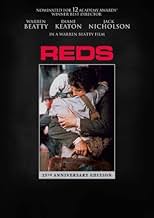A radical American journalist becomes involved with the Communist revolution in Russia, and hopes to bring its spirit and idealism to the United States.A radical American journalist becomes involved with the Communist revolution in Russia, and hopes to bring its spirit and idealism to the United States.A radical American journalist becomes involved with the Communist revolution in Russia, and hopes to bring its spirit and idealism to the United States.
- Won 3 Oscars
- 22 wins & 37 nominations total
Eleanor Wilson
- Mrs. Reed
- (as Eleanor D. Wilson)
- Director
- Writers
- All cast & crew
- Production, box office & more at IMDbPro
Storyline
Did you know
- TriviaReportedly, Warren Beatty reshot some scenes up to 35 times. Paul Sorvino said he did as many as 70 takes for one scene, and Maureen Stapleton said she did as many as 80 takes for another. Reportedly, of this, she famously once said to Warren Beatty, "Are you out of your fucking mind?" This earned her a round of applause from the crew.
- GoofsThe Finnish doctor tells Reed that his blood pressure is too high, but at that time, hypertension was not considered a problem by most doctors, who did not even consider treating it. Not until the mid-'40s did doctors begin to understand the dangers of high blood pressure.
- Quotes
Eugene O'Neill: If you were mine, I wouldn't share you with anybody or anything. It'd be just you and me. We'd be the center of it all. I know it would feel a lot more like love than being left alone with your work.
- Crazy creditsAs the credits roll, additional interviews with the 'witnesses' play.
- Alternate versionsThree seconds of horse falls were cut from the British version. The DVD supplements showing these shots are also cut in England.
- ConnectionsFeatured in Sneak Previews: Rollover, Quartet, My Dinner with Andre, Reds (1981)
- SoundtracksYou're a Grand Old Flag
Written by George M. Cohan
Featured review
.
I am old enough to have lived through (probably) three different Americas. These are radically different worlds. It isn't just the mood, styles or state of the economy; its the adoption of a whole cosmology. Religions change under our feet. Family, love, belonging. These things are malleable yet largely beyond our control and we forget what "things were like." Memory always is constructed in terms of the present world.
Always.
So projects like this are necessary. We cannot know who we are unless we remind ourselves who we were.
The ordinary fold here is a romance, folded into grand political actions. Here they are a bit more cerebral than usual, but never getting past the notion of simple justice.
The more unusual and complex fold is that we see a story based on real events and people. Interspersed with that story are interviews of people who were personally involved in the story. These are remarkable, the way they are captured and the way they are edited to overlap with and annotate the story. But much more engaging is that these are enticing people, many with minds and phases that invite us into their faces made warmer and more open by Beatty's camera. I compare this to the "Up" serious and the contrast is astonishing. True, here we want to be informed about the lives of others, and the "Up" goals pretend that the people randomly selected decades ago are remotely worth knowing.
But these folks are. We want more, simply based on their implicit invitation, and we carry ourselves into the narrative more forcefully, sort of like the characters do. This is folding doing its job and doing it well. They remember. I remember, and therefore am.
Ted's Evaluation -- 3 of 3: Worth watching.
I am old enough to have lived through (probably) three different Americas. These are radically different worlds. It isn't just the mood, styles or state of the economy; its the adoption of a whole cosmology. Religions change under our feet. Family, love, belonging. These things are malleable yet largely beyond our control and we forget what "things were like." Memory always is constructed in terms of the present world.
Always.
So projects like this are necessary. We cannot know who we are unless we remind ourselves who we were.
The ordinary fold here is a romance, folded into grand political actions. Here they are a bit more cerebral than usual, but never getting past the notion of simple justice.
The more unusual and complex fold is that we see a story based on real events and people. Interspersed with that story are interviews of people who were personally involved in the story. These are remarkable, the way they are captured and the way they are edited to overlap with and annotate the story. But much more engaging is that these are enticing people, many with minds and phases that invite us into their faces made warmer and more open by Beatty's camera. I compare this to the "Up" serious and the contrast is astonishing. True, here we want to be informed about the lives of others, and the "Up" goals pretend that the people randomly selected decades ago are remotely worth knowing.
But these folks are. We want more, simply based on their implicit invitation, and we carry ourselves into the narrative more forcefully, sort of like the characters do. This is folding doing its job and doing it well. They remember. I remember, and therefore am.
Ted's Evaluation -- 3 of 3: Worth watching.
Details
- Release date
- Country of origin
- Languages
- Also known as
- Comrades
- Filming locations
- Senate Square, Helsinki, Finland(on location)
- Production companies
- See more company credits at IMDbPro
Box office
- Budget
- $32,000,000 (estimated)
- Gross US & Canada
- $40,382,659
- Opening weekend US & Canada
- $2,325,029
- Dec 6, 1981
- Gross worldwide
- $40,382,788
Contribute to this page
Suggest an edit or add missing content



